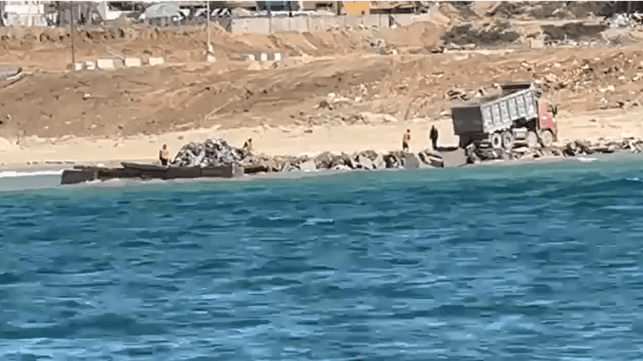Two NGOs Complete a "Crazy" Aid Delivery to Makeshift Pier in Gaza

The first port-free maritime shipment of aid to Gaza has been delivered, despite the risks of operating a barge near the surf zone without a formal pier, and a second is about to get under way.
NGOs World Central Kitchen (WKC) and Open Arms towed a small barge with about 200 tonnes of food aid to the coast of Gaza last week and delivered it alongside at a homemade jetty. (Gaza does not have any substantial port infrastructure.)
WKC acknowledged in advance that the delivery would be a risky attempt, with a high chance of failure - but said that it would be worth accepting the hazards because of the looming famine in Gaza.
A video of the operation shows the improvised nature of the pier, which might give commercial vessel operators pause. The dirt-and-rubble jetty extended out from an unprotected beach, no more than a hundred yards out from the surf zone. The tug did not approach the shore directly; instead, two RIBs guided the barge in to its berth. It was moored with its beam to the far point of the jetty, with breasting wires to hold it steady. A mobile crane hoisted the pallets off onto a truck for shoreside delivery.
Update from Gaza???? WCK is offloading almost 200 tons of rice, flour, proteins & more that arrived by sea earlier today. At the same time this shipment is transported ashore, our second vessel is preparing to set sail from Cyprus with hundreds more tons of food. #ChefsForThePeople pic.twitter.com/cHacgMJQ6c
— World Central Kitchen (@WCKitchen) March 15, 2024
"You knew we had to go to Gaza, had to give it a shot, even if it was crazy," said Open Arms founder Oscar Camps, addressing World Central Kitchen's Chef Jose Andres in a social media message. "You called up another crazy person, and we did it."
The next shipment will be delivered by a merchant vessel, the Jennifer, accompanied by an anchor-handling tugboat for maneuvering and cargo handling. The second shipment will include a large consignment of dates, which have spiritual significance during Ramadan, WKC said in a statement.
Aid groups say that these maritime shipments (and parallel U.S. and EU initiatives) are only necessary because Israel has sealed most land crossings into Gaza, prohibiting or sharply restricting aid. The northern half of the strip is most severely affected, as it is the furthest from the limited crossings near the Egyptian border.
Over the weekend, the UN Office for the Coordination of Humanitarian Affairs (OCHA) said that "there is no alternative to the large-scale delivery of aid by land." The White House and the EU's aid coordinator made similar acknowledgements in a statement early last week.
"[The famine] is manmade," said EU foreign policy chief Josep Borrell. "When we look for alternative ways of providing support by sea, by air, we have to remind [ourselves] that we have to do it because the natural way of providing support through roads is being . . . artificially closed."
 Stay on Top of the Daily Maritime News The maritime news
Stay on Top of the Daily Maritime News The maritime news
that matters mostGet the latest maritime news delivered to your inbox daily.
The Israeli military has a responsibility to facilitate the movement of humanitarian aid into and across #Gaza, safely, regularly and at the scale required.
— UN Humanitarian (@UNOCHA) March 15, 2024
There is no alternative to the large-scale delivery of aid by land.
Watch how humanitarian assistance reaches Gaza ?? pic.twitter.com/tDcjJckQET
